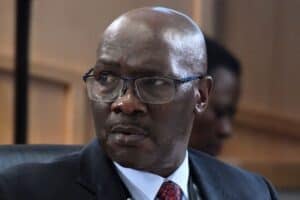Both independent candidates and parties have to produce the same amount of signatures.

Parliament’s Portfolio Committee on Home Affairs has resolved to lower signature requirement quota in the Electoral Amendment Bill.
Following deliberations on Tuesday morning, the committee decided to reduce the number of signatures required by independent candidates and political parties to contest an election.
Signature requirement
The committee last week was briefed by the Department of Home Affairs’ lawyers on the signature requirement.
Advocate Mitchell de Beer suggested that the quota be lowered to 15%, as it would be a barrier for independent candidates to contest elections if kept at 20%.
Before Tuesday’s decision to reduce the quota, the bill had required independent candidates to produce signatures and identity numbers of voters supporting their candidature totalling 20% of the quota for a seat in the previous election.
ALSO READ: IEC ‘concerned’ as Electoral Amendment Bill could affect other laws ahead of 2024 elections
Both independent candidates and parties – who are registered but not represented in the National Assembly (regions) or provincial legislatures – have to produce the same amount of signatures.
While the ANC, Democratic Alliance (DA) and Inkatha Freedom Party (IFP) supported the reduction to 15%, the Economic Freedom Fighters (EFF) opposed this.
“Us lowering the threshold to 15% is not going to satisfy civil society organisations. Our view as the EFF has always been that the threshold must be high enough to discourage any chance takers from participating as an independent candidate,” EFF MP Thapelo Mogale said.
Watch the meeting below:
Clause 23
The committee on Tuesday also resolved that Home Affairs Minister Aaron Motsoaledi must appoint a panel of experts to investigate comprehensive electoral reform rather than Parliament.
The EFF and IFP wanted to responsibility of the electoral reform panel lie with Parliament in consultation with the Independent Electoral Commission (IEC).
“I think it will be proper to allow Parliament to be included in he process,” Mogale said, while IFP MP Liezl van der Merwe suggested that the panel report its findings to an ad hoc committee.
The bill has included Clause 23, proposed by Department of Home Affairs, as a provision.
The clause will see the establishment of a panel of independent experts to look into the reform of South Africa’s electoral system after the 2024 elections.
READ MORE: 2024 polls could be delayed as legal action looms against Electoral Amendment Bill
The panel, which will have to be appointed within four months of the enactment of the bill, will be appointed by Motsoaledi.
It will be tasked to investigate whether reforms are necessary to the electoral system; the possible options for reforms; and the potential advantages and disadvantages for each option identified, according to the clause.
The panel must also submit a full report, with its findings, to the minister within 12 months of the date of the elections.
Once the report is submitted, the minister must immediately table it before Parliament for its consideration and make the document available to the public.
It will be up to Parliament to decide on what, if any, electoral reforms should be adopted on the basis of the panel’s recommendations.
Process
The committee, which has to adopt the bill with the latest changes before it heads back to the National Assembly, is expected to meet on Tuesday.
The draft legislation has to be voted on by MPs in the National Assembly and will then head to President Cyril Ramaphosa for approval.
The process has to be completed by 28 February as per the ruling of the Constitutional Court (ConCourt).
NOW READ: People ‘should definitely be worried’ about Electoral Amendment Bill – analysts






